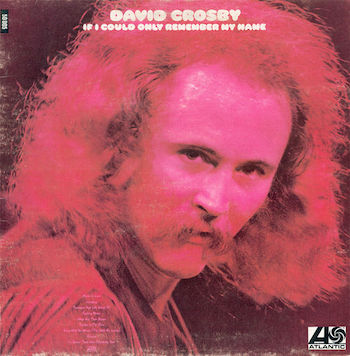Arts Remembrance: David Crosby — One More Link to Rock ’n’ Roll’s Golden Era Lost
By Scott McLennan
When I glorify or romanticize an artist like David Crosby it is because the performer has a gift for alchemizing songs into something huge, powerful, spiritual, and communal.
 With the death of David Crosby this week, we have lost one more link to rock ’n’ roll’s golden era, when the art was vibrant, growing and seemingly driving the musicians rather than the other way around.
With the death of David Crosby this week, we have lost one more link to rock ’n’ roll’s golden era, when the art was vibrant, growing and seemingly driving the musicians rather than the other way around.
When I glorify or romanticize an artist it is inspired by that sort of magic — not so much the fame, treasures, or glory that inevitably follow success, but the gift for alchemizing songs into something huge, powerful, spiritual, and communal.
Crosby was one of those dudes, and, not to sound like an old crank, we do not have many women and men making music today who can pull off what he and his peers were doing in the ’60s and ’70s.
Of course, given that superb artists like Crosby built up something so huge — culturally and commercially — it was inevitable that rock ’n’ roll would fall in on itself. Great and meaningful rock ’n’ roll is being made today, but you don’t see it resonating on the grand culture scale that was powered by Crosby and his various groups.
You don’t need me to recount Crosby’s history as a founding member of the Byrds and Crosby, Stills, Nash & Young. Nor do you need me to point out what happened when Neil Young joined CSN or to remind you to check out those sometimes-overlooked Crosby-Nash records.
And by now you have been told by many others about Crosby’s phenomenal vocal skills and distinctive guitar playing, or just how crucial he was to making the bands that he belonged to greater than the sum of their parts. All true.
And, man, make sure you do yourself the favor of using Crosby’s 1971 solo album opus If I Could Only Remember My Name as the soundtrack for a blissful evening sometime.
I feel fortunate to have seen Crosby many times with CSN plus a couple of times with CSNY and a couple of times as C-N.
But the real power of Crosby hit me when I saw him perform all alone, armed with only a single acoustic guitar.
It was New Year’s Eve 1986, and Crosby played his first public concert since being released from a Texas prison after serving nine months on a drug conviction. He was facing an arena full of people there to see the Neville Brothers and headliners Grateful Dead.
There, alone on stage, it was so clear that he was a man who had literally been torn between idealism and hedonism — as apt a representation of the counterculture as you’ll ever need.
An arch performer, Crosby supplied some self-effacing jokes: he lamented his idiocy of getting busted in Texas and apologized to anyone sleeping on an uncomfortable mattress he may have made in the prison shop.
Then, in a surprisingly non-preachy moment of candor, Crosby confessed that in the last few years of heavy drug use he hadn’t written any songs. He said he felt as if he was a failure, admitting that, if he had a purpose in this lifetime, it was to write songs.
That led into him playing a song he had written in prison. It was “Compass,” and it’s about finding your way.
A bit on the nose? Absolutely. But the song was a crucial step forward for Crosby, who, from then until his final days, became the artist and performer he was truly capable of being. Idealism triumphed over hedonism (though he remained wildly irascible, and none too concerned with following all the rules, as later weapons charges would bear out).
Because my hair stretches down to the middle of my back, I frequently get people of a certain age pushing Crosby’s “Almost Cut My Hair” in my face. And yes, it is one of my favorite Crosby songs, but not because of that oft-quoted “I feel like letting my freak flag fly” lyric.
That line sure did get the crowd roaring at the New Year’s Eve Dead show. But for me, the next verse is the one that holds the song’s liberating power:
But I’m not giving in an inch to fear,
Cause I promised myself this year
I feel like I owe it to someone.
On that night Crosby, all alone, sang it with conviction that bound his journey to ours, nurturing a feeling in us that we have the strength to persevere. It was a communal celebration of the individual spirit. And it is that kind of magic I will sorely miss experiencing with the passing of David Crosby.
Scott McLennan covered music for the Worcester Telegram & Gazette from 1993 to 2008. He then contributed music reviews and features to the Boston Globe, Providence Journal, Portland Press Herald, and WGBH, as well as to the Arts Fuse. He also operated the NE Metal blog to provide in-depth coverage of the region’s heavy metal scene.

Well said
UGH! In the words of John McEnroe, “you can’t be serious.”